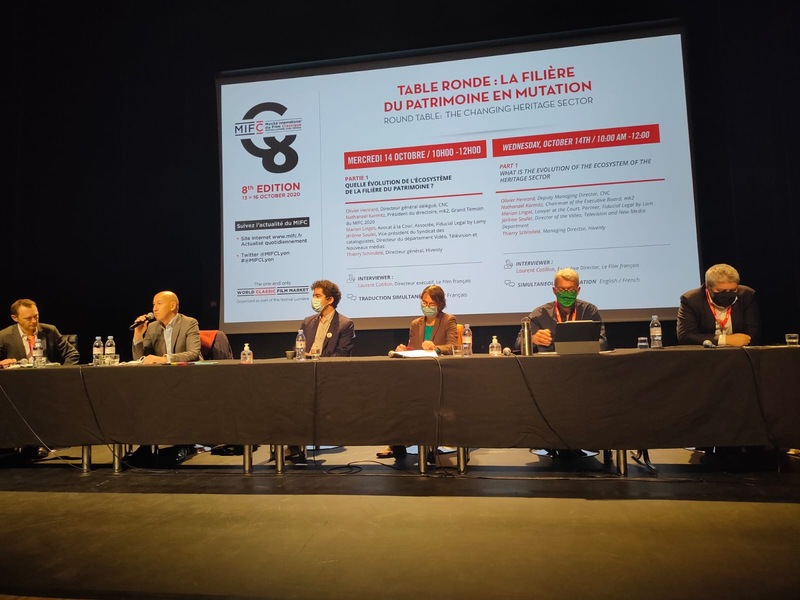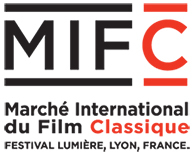The changing heritage sector
Part 1 - What is the evolution of the ecosystem of the heritage sector
Several actors from the heritage film industry met at the International Classic Film Market to discuss the evolution of this branch in the era of dematerialized platforms. A meeting presented by the moderator Laurent Cotillon, Executive Director of French Film. 
Wednesday, October 14, 2020, Karbone screenroom. Second day of the 8th edition of the International Classic Film Market (MIFC): Olivier Henrard (Deputy managing director - CNC), Nathanaël Karmitz (Chairman of the Executive Board - MK2 and Special Guest of the MIFC 2020), Marion Lingot (Lawyer at the court, Partner, Fiducial Legal by Lamy), Jérôme Soulet (Catalog director - Gaumont) and Thierry Schindelé (Managing Director - Hiventy) came to discuss the heritage sector. A branch of cinema currently undergoing major changes following the appearance of dematerialized platforms and the recent health crisis linked to the appearance of Covid-19. Thierry Frémaux (General Director - Lumière Institut) came to introduce this round table: "I'm still like the Good Samaritan who doesn't believe in the death of cinema, the death of the DVD, the death of theaters. One always reacts to negativity. It's the same with Heritage cinema. We try to make old films exist. Even if the figures for the target market are falling, there is still a real demand and rich catalogs at our disposal. We want to live surrounded by DVD/Blu-ray, by the films that made us."
After this introduction, and to open the discussion, Laurent Cotillon, moderator, immediately asked Olivier Henrard to explain the definition of a Heritage film. Because sometimes this terminology remains a bit vague. "It is a film that is important in terms of History", the CNC's Deputy managing director began. "A significant film of a period, in a catalog, a technological progress or in the evolution of its director." Once this foundation was laid, Olivier Henrard reaffirmed the CNC's position in the preservation of Heritage Cinema, guaranteeing that it is "a mission that has been part of [our] DNA for 50 years." The Deputy managing director specified in particular that, from 2012 to 2017, the CNC had set up an exceptional financing of 70,000,000 euros devoted to a restoration plan. This financial assistance is available to the right holders. At the end of this program, more than 1,200 heritage films have been restored. In 2021, a little less than 3,000,000 euros will be devoted to the digitization of heritage films. Olivier Henrard continues: "In the recovery plan that the Minister of Culture announced a few weeks ago, Heritage has its place. We have 105,000,000 euros at the CNC to finance the new measures and of these 105 million, we have almost 2,000,000 euros that will be dedicated to Heritage. Half of this amount will go to support French film libraries and a little less than a million euros, which will allow us to strengthen our selective aid for video publishing to enable the sector to develop within the Heritage appellation". The CNC's Deputy managing director also confirmed that the perpetuation of Heritage films for young audiences was a crucial part of their missions.
Nathanaël Karmitz, Chairman of the Executive Board at MK2 and Special Guest of the MIFC 2020, returned to the subject of supply and demand in the context of the Patrimoine cinema. "We can't expect everything from demand, we have to make Heritage films exist through the proposal and accessibility of the films. Distribution remains the real problem because the appetite for this cinema is there... But we have to go and find it." For his part, Jérôme Soulet, Catalog director of Gaumont, expressed a little more reserve about the exhibition of heritage works, particularly through the dematerialized platforms that are now well anchored in the lives of spectators. "At the risk of being in the opposite wind, we must understand that these people are merchants. Their objectives are not cultural diversity or image education. Their goal is to make money. It's the same for private television channels... You can blame the platforms, but when a private channel, on Sunday evening at 10:00 pm, has the choice between an American comedy with a strong cast and a black and white Heritage film, also with a strong cast but which is thirty or forty years old, the choice of the channel in relation to advertising is going to be made very quickly". He also explains that young audiences have turned away from cinemas, including and especially from Heritage films, especially the 15/25 year olds. For him, this age group is "already lost", particularly because of the video game sector which has exploded in recent years. Jérôme Soulet believes that the 15/25 year olds will return to cinema when there is a family transmission in a few years. Olivier Henrard in turn comments on the desertion of young audiences from cinemas: "The average age of movie-goers in cinemas is only getting older... The integration of platforms into our ecosystem is a historic project, it's not going to happen overnight. It's a matter of public policy. We're going to have to grasp it, we're going to have to talk about it with the platforms as well."
Nathanaël Karmitz catches the ball: "We can't say it's automatically lost. That would be very cynical. In our jobs, we must never give up. We must bring back one by one all these kids. The fundamental problem comes from the price of cinema tickets, especially when you see that a ticket is the equivalent of a monthly subscription to any platform. It's a hindrance for all these young people, we see it in the Paris region with our cinemas". The Special Guest of the 2020 MIFC recontextualized certain statistical realities, notably that the mk2 Bibliothèque, in Paris, with a 4.90 euro seat for the under-26s, represented an attendance of 1,000,000 young spectators per year. "For all types of cinema and entirely in the original version. These are people who come from all over the Ile-de-France region. Young people's attendance has increased in our cinemas. It's something visible," adds Nathanaël Karmitz. Concerning image education, the Chairman of the Executive Board at mk2 says that there is a lack of measures, including training for image education teachers. This is of vital and necessary importance for him in order to perpetuate the appetite of the youngest members of society for the cinema, especially Heritage. Thierry Schindelé, Managing Director of Hiventy, a key player in the French and international audiovisual technical services, explains that technical progress on the side of broadcasters is an eternal restart. Already because of the multiple formats (HDU, 4K, etc...) and certain paradoxes linked to restoration: "It is sometimes easier to restore a film that is more than 30 years old than one that is less than 15 years old. The arrival of new technologies inevitably leads to new types of restoration. Everything is accelerating very quickly whereas for a while we thought that 4K would be a definitive format." Nathanaël Karmitz thus reaffirmed the importance of supporting the labs that work on the restoration of heritage films but which sometimes lack financial means.
Marion Lingot, a lawyer at the Court, Partner, Fiducial Legal by Lamy, spoke in turn on the legal aspect of cinema: "Access to works, and even more so since the health crisis we have been going through, is now essentially via the digital channel. It was already a trend before, but today it has become more pronounced. The digital market is made up of players who are essentially interested in their business model, and so they are traders like any other. For some time now, the cinema has been part of the digital companies' behavioural patterns. If there are current changes, there are also legal levers to verify the plurality of product offerings, the protection of authors and rights holders. As well as laws against piracy." Finally, the case of television broadcasting of the Patrimoine cinema was also discussed at the end of the round table. If the work of Arte was praised, including during the confinement, some MIFC 2020 interlocutors tackled France Télévisions. These arguments were put forward during the Video Editors' Tribune yesterday, Tuesday, October 13. Nathanaël Karmitz described the television group's programming as "flat", before driving home the point that "France Télévisions has abandoned the field of heritage cinema for more than ten years". The Chairman of the Executive Board at mk2 and Special Guest of the 2020 MIFC concluded this meeting moderated by Laurent Cotillon by explaining that we were going through a difficult time but that we had to "take advantage of it to change things".



